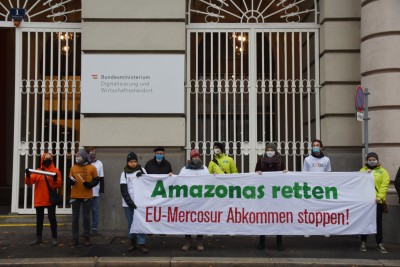EU-Mercosur Pact: Austria's Balancing Act between Trade Opportunities and Sustainability
The discussion about the free trade agreement between the EU and the Mercosur countries - Brazil, Argentina, Uruguay, and Paraguay - is entering a new round. While some see the treaty as an opportunity to intensify trade between the two economic areas, others raise serious concerns about its impact on the environment and social standards.
 The EU and the Mercosur zone are seeking increased cooperation, but Austria is against it: experts and activists are calling for the end of the agreement, while Austrian industry and trade see opportunities. / Picture: © Attac Austria / Elisabeth Blum / Flickr Attribution (CC BY-SA 2.0, https://creativecommons.org/licenses/by-sa/2.0/)
The EU and the Mercosur zone are seeking increased cooperation, but Austria is against it: experts and activists are calling for the end of the agreement, while Austrian industry and trade see opportunities. / Picture: © Attac Austria / Elisabeth Blum / Flickr Attribution (CC BY-SA 2.0, https://creativecommons.org/licenses/by-sa/2.0/)
Negotiations for an association agreement between the EU and Mercosur, the economic alliance consisting of Argentina, Brazil, Paraguay, and Uruguay, have been ongoing since 2000, Vindobona.org reported. Environmental and social concerns, in particular, have delayed the process so far. In September 2019, the EU subcommittee of the Austrian National Council voted against the EU-Mercosur agreement, obliging the government to take a stand against it at the EU level as well. Vienna in particular is known for its critical voices against the agreement.
Researchers from the University of Vienna and the University of Natural Resources and Applied Life Sciences recently criticized the planned agreement, saying it contradicts the EU's goals of sustainable economic restructuring. As APA reports, they fear an increase in imports such as soy and meat from the Amazon, which will lead to the clearing of large areas of rainforest. The draft's environmental controls are judged inadequate.
"The political rules for international trade need to be relaunched, based on high environmental and social standards," the scientists say. They see the EU as having a duty to lead the way with a fair and ecological agreement, thus putting pressure on other trading partners.
Brussels sees trade benefits
Rupert Schlegelmilch, the EU chief negotiator for the agreement, found himself in the House for a debate with National Council members, especially from the EU subcommittee, and is optimistic. He stresses the economic benefits and sees the treaty as a response to China's growing influence on world markets. The geopolitical situation has changed since 2019, he said, and increased cooperation with the democratic Mercosur countries is needed.
Schlegelmilch acknowledges that the agreement is controversial in Brussels. However, he says there are minor changes that could lead to a more positive assessment. He emphasizes that some environmental standards are even better observed in the Mercosur states than in the EU.
Austria's position
Austria had already rejected the agreement in 2019. Experts from the Chamber of Labor and various environmental associations are calling for rejection, while the Federation of Austrian Industries and the Chamber of Commerce support the agreement.
The agreement was particularly criticized because of environmental concerns, especially due to the policies of former Brazilian President Jair Bolsonaro. However, his successor, Inácio Lula da Silva, has promised effective protection of the Amazon rainforest.
Austrian parties remain critical
Martin Engelberg, a member of the Austrian People's Party (ÖVP), criticized the EU subcommittee's rejection of the EU-Mercosur agreement in 2019 as "not quite as reasonable" but should be respected. He also acknowledged the changed global political situation and called for a more objective debate, particularly regarding the agricultural implications of the agreement. The Mercosur countries insisted on more freedom in various policy areas, such as ensuring better responses to health sector crises and opposing sanctions for violations of environmental standards and the effects of the Supply Chain Act. Schlegelmilch emphasized the need for clarification on the extent of the agreement's amendment.
Critics from Austria, France, and the Netherlands have expressed concerns about the agreement's economic opportunities for both sides. Stephan Matznetter (SPÖ) asked about the extent of stakeholder involvement in the negotiation process and how it could prevent the agreement from fueling an anti-EU mood among farmers. Clemens Stammler (Greens) said the EU-Mercosur agreement was "out of time" as it ran counter to European efforts to pursue a more climate-friendly policy. Peter Schmiedlechner (FPÖ) rejected the agreement, stating that it represented "madness" not only in terms of environmental policy but also in terms of social impact on the population in the Mercosur countries and Europe's rural areas.
The EU-Mercosur agreement poses a challenge to the EU, but especially to Austria. While it promises economic opportunities, environmental and social standards must not be neglected. The EU must carefully consider how to reconcile its economic interests with its commitment to sustainability.



